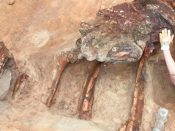The recovery of the vegetation component after disturbance in an ecosystem is often fairly good, but the original structure and functioning of the ecosystem take longer to be restored. Revegetation is one of the main tools used as the first step for restoring a degraded or degradation-prone ecosystem, especially when keystone plant species have disappeared due to the disturbance frequency and intensity or to the combination of several drivers acting either at the same or at different times. Special attention has to be paid when dealing with arid to semiarid areas where the ecosystem functioning follows a sink-source pattern that affects conservation and flows of resources. The success of revegetation actions depends on many factors related to plant management: species selection, seed and seedling quality, site preparation, and the early availability of light and soil resources. Many different techniques aimed at overcoming these constraints will be described during the training school.
This Iberian Training School will focus on drylands ecological restoration and agricultural land management in order to combat desertification through the establishment and management of vegetation. We will provide the students with the scientific basis and practical guidance in field classes for sustainable land use, and we will create and strengthen links between them and established experts. In addition to classroom lectures, there will be practical classes and field trips to apply relevant methodologies for successful revegetation and soil conservation.
Each student will be expected to give a short presentation (3 slides) about his/her scientific and professional background, and at the end of the training school they will present how they will incorporate the acquired knowledge to their own work.
In Portugal, the training school will be coordinated by Cristina Branquinho (Associate Researcher of the Faculty of Sciences University of Lisbon) in collaboration with Portuguese and Spanish trainers which will deliver lectures and practical classes. In Spain, the training school will be coordinated by Alejandro Valdecantos (CEAM-University of Alicante) and María José Marques (Autonomous University of Madrid), in collaboration with Spanish trainers which will organize field trips and lecture classes.
How to apply
Send a letter of application stating your reasons for wanting to take part in the Training School to María José Marqués (mariajose.marques@uam.es) by 17 April 2015. The letter should be accompanied by the following documents:
(1) a 1-2 page CV containing your personal information, current home and university/institution mailing addresses, e-mail, Skype name (if possible), university education background including current enrolment status, training/work experience, publications.
(2) a 1 page letter of motivation stating why you would like to participate in this training school.
(3) for PhD students only: contact details of your supervisors.
COST Action ES1104 ‘Arid Lands Restoration and Combat of Desertification: Setting up a Drylands and Desert Restoration Hub’ focuses on practical measures that can be used by practitioners, stakeholders and authorities to restore degraded drylands and manage their recovery.





















